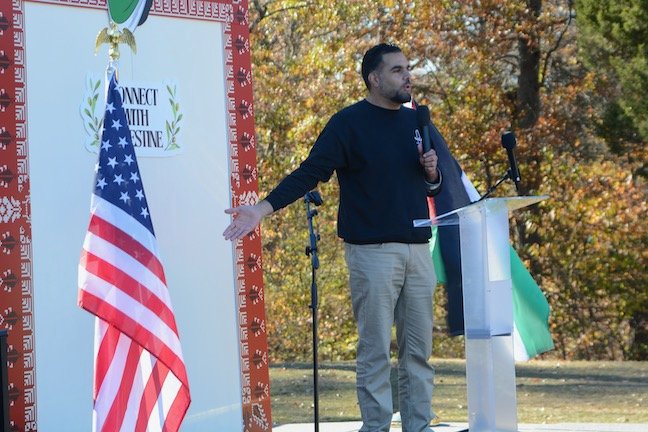
Messages of peace, compassion and following what one’s heart knows to be right were delivered by several speakers June 18 at the sixth annual Interfaith/Iftar Dinner hosted by Masjid-e-Ali mosque on Cedar Grove Lane.
The mosque holds the dinner each year during the Muslim holy month of Ramadan.
Christian pastors from township churches, Mayor Phillip Kramer and an Islamic scholar from Chicago were the featured speakers during the event.
The evening’s keynote speaker was Imam Sulayman Hassan, an Islamic scholar and the religious director of Chicago’s Baitul Ilm Islamic Center.
One can be a muslim – with a lower case “m” – without believing in the Islamic faith, Hassan said. That’s because in Arabic the word “muslim” means “to submit, not to fight against what we know to be correct,” Hassan said.
These so-called “small ‘M’ muslims” are those who “submit to that which your mind and heart knows to be true,” he said.
Big ‘M’ mMuslims, those who believe in the Islamic faith, have nothing to fear from their counterparts, Hassan said.
“That doesn’t weaken our own identity, and it doesn’t weaken our relationship with our faith,” he said. “It strengthens it and, more importantly, it grounds it.”
Rev. Osy Nuesch of Six Mile Run Reformed Church in Franklin Park told the crowd that many people are overcome with “prejudice, hate and evil,” but added that “hopelessness may well be the worst enemy.”
“We need to hold on to love and compassion,” Nuesch said. “We want to make sure that we do not fall for an easy characterization of what evil is.”
Alex Kharazi, a founder of the mosque and the evening’s coordinator, referenced the mass shooting in Orlando, Fla. in his remarks.
“Wat he did there had nothing holy or Islamic about it,” Kharazi said, referring to Omar Mateen, the Orlando man who killed 49 people and wounded 50 others in a gay nightclub what’s been called the worst mass shooting in American history. Mateen, a Muslim, reportedly pledged his allegiance to the leader of ISIS during the attack, but officials are questioning whether the attack had anything at all to do with religion.
“We hold the victims and their families son our hearts and prayers,” Kharazi said. “Their grief is our grief, their fear is our fear. We are all one family.”
“Even in the face of this tragedy, the holy month of Ramadan gives us hope and the faith that we can come together as Americans and focus on what unites us,” he said. “Let us pray for peace that one day everyone can go to a place of his or her choice, be it a mosque, a church, a temple, a club or a park, without any fear or intimidation. For a day that not only we tolerate one another, but love one another.”
Special certificates of appreciation were also given to four people and two organizations.
Kramer was one of the people presented with an award for “his leadership role in promoting unity and harmony among diverse community members,” Kharazi said.
“I believe that the people at this event are enlightened,” Kramer said, after receiving the award. “The fact that you chose to honor a Jew at an interfaith iftar means that you are enlightened.”
“It is people like the people who choose to be here tonight who can lead the way to one community,” he said.
Also receiving awards were Pastor George Montanari of Middlebush Reformed Church for his “leadership role and dedication to promote unity and harmony among people of various faiths;” Rev. Annari Griese, director of pastoral care at JFK Medical Center in Edison; Zamir Hasan, founder of Muslims Against Hunger and Nancy LaCorte, who received an award for the Franklin Food Bank.
The two organizations were also presented with $1,000 donations by the mosque community.
 The Franklin Reporter & Advocate Eight Villages, One Community
The Franklin Reporter & Advocate Eight Villages, One Community


























